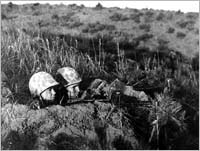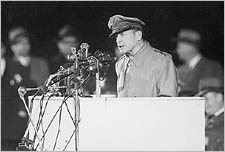 |
 |
 |
|||
 |
Home | The Unfinished War | Integration | What Communist Leaders Were Thinking | |||
|
The Cold War Turns Hot
Truman vs. MacArthur
"Certainly [there's] nothing in the 20th century to compare with it," says historian Flint. "We were defeated! The people were shocked, the Congress was shocked, the President and his staff were shocked." With the Chinese entry into the war, Harry Truman faced perhaps his gravest decision yet. "The future of civilization depends on what we do - on what we do now, and in the months ahead," Truman said in a speech to the nation on December 15th, 1950. The long-running tension between the president and his aggressive commander, MacArthur, now bloomed into a confrontation. MacArthur's Inchon landing in September had been a brilliant success, his late-November march for the Yalu a catastrophe. Now MacArthur wanted to up the ante again. He asked to unleash the United States' allies in Taiwan (then known as Formosa), to bomb Chinese bases in Manchuria, and he demanded more U.S. troops to attack the Chinese. The proud general wanted to undo his humiliating defeat, says Flint. "His position in history was at stake here." So was Truman's. The president and his advisers wanted no part of a wider war with China - a war that, they feared, might well be joined by the Soviet Union with its superior conventional forces and its new atomic capability. The Truman administration began signaling that it would try to fight its way back to a "position of strength" - regaining lost ground south of the 38th Parallel - and then seek a negotiated end to the war. Over the next several months, as fighting continued, MacArthur made a series of public statements that seemed aimed at sabotaging that goal. In press interviews, conversations with foreign diplomats, and letters to veterans' groups, MacArthur ridiculed the notion of a negotiated peace and complained of the "restrictions" and "inhibitions" being placed on him from Washington. In late March, while Secretary of State Dean Acheson floated hints of a willingness to talk with the Chinese, MacArthur issued a statement taunting the Chinese as an overrated military force and demanding that the commander of the Chinese Army meet with him personally or risk a wider war. The statement violated an explicit administration ban on unauthorized foreign policy pronouncements. Finally, in early April, Republican Congressman Joseph Martin read a letter from MacArthur on the House floor; in it, MacArthur deplored his bosses' decision not to use forces from Formosa against the Communist Chinese. That did it. "I have thought long and hard about this question of extending the war in Asia," Truman said in an address to the nation on April 11th, 1951, explaining his decision to use restraint in Korea - and to fire the legendary MacArthur. "I believe that we must try to limit the war to Korea for these vital reasons," Truman went on: "to make sure that the precious lives of our fighting men are not wasted; to see that the security of our country and the free world is not needlessly jeopardized; and to prevent a third world war. A number of events have made it evident that General MacArthur did not agree with that policy." "I was happy," recalls Army veteran Harry Cohen, now of Boynton Beach, Florida. He was in the hospital recovering from a combat wound when he heard Truman had relieved MacArthur. Cohen had never agreed with the decision to pursue the North Koreans north of the 38th Parallel. "Of course the guy in the next bed said, 'Hey, we should go all the way and go through Moscow!' I says, 'You're crazy. They got a lot more Chinese than we have Americans.'" Cohen estimates that U.S. soldiers, "four to one," supported the firing of MacArthur. Edwin Simmons didn't agree. He and his cohorts in the Marines, he says, were "shocked and disappointed" at MacArthur's firing. Simmons, like many other observers, thought Truman saw the Republican MacArthur as a potential rival for the presidency. "We saw this as the machinations of a politically-minded president against a leader in the field," Simmons says.
"Once war is forced upon us," MacArthur intoned, "there is no other alternative than to apply every available means to bring it to a swift end. War's very object is victory, not prolonged indecision." But public enthusiasm for the hawkish MacArthur wouldn't last. His career was over. Next: A Necessary War?
|
||||

